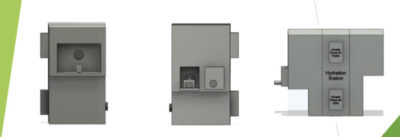In Phoenix, Arizona, temperatures often soar to 100+ degrees in the summer — leaving many of the city’s homeless vulnerable to dehydration. To help, the Human Services Campus, a local organization that supports people struggling with homelessness, is distributing free bottled water. However, this has created another problem: plastic waste.
With the ongoing global issue of plastic pollution, Engineering Projects in Community Service (EPICS) in IEEE has awarded a $2,000 USD grant to a team of students from Arizona State University (ASU), who will design a hydration station, an invention that allows the city’s homeless to clean and refill any type of reusable water bottle. A multidisciplinary team of ASU students from various science and engineering backgrounds is liaising with the Human Services Campus on the project to keep the Phoenix homeless population hydrated and the environment clean.
Expected to be completed in December, the station will need to provide water to at least 2,000 people a day, according to team leader Seth Storino.
“Phoenix, it’s a pretty hot city, so water consumption is going to be at an all-time high during the summer,” Storino told EPICS in IEEE.

Virtual Design Idea for the Hydration Station
The station will need to contain two major components: A sanitation system that will clean the bottles with soap and a refilling system with filtration to ensure the water is clean. However, to design a hydration station that can support such a large population but which is also affordable and sustainable, the team faces a few technical and logistical problems. They will need to determine how many gallons of water will be necessary each hour to keep the water flowing, as well as a reliable water source. They also need to develop a prototype that can clean bottles effectively while conserving as much soap as possible, so they can install multiple stations across campus without exceeding their budget.
“That will also ensure more water supply for the homeless,” Storino said.
The prototype also will comply with the Americans with Disabilities Act Standards for Accessible Design (ADA), so it will be accessible to people with disabilities. The team is closely working with ASU ADA Coordinator, Peter Fischer, to ensure that the hydration station is inclusive for all. The team will take special care of those with disabilities by factoring in their daily challenges in order to accommodate their access to the hydration station.
Once the prototype is developed, the next step will be to invite the city’s homeless to test it and provide feedback, according to David Backus, Director of Operations, Human Services Campus.
“If they see something we can change or adapt, that would make it more useful, and they’ll use it more often,” Backus said.
The hydration station is expected to provide up to 2,050 homeless people with clean drinking water each month, while eliminating as many as 1,000 plastic water bottles a week, according to Krickette Wetherington, Project Manager at the Action Nexus at ASU Watts College of Public Service & Community Solutions, who serves as a liaison between Storino’s team and the Human Services Campus.
“The ability for the clients of the Human Services Campus to have their own reusable bottles not only helps the environment – it also helps give clients a sense of ownership and belonging,” Wetherington said. “It also allows for a level of independence and brings dignity to those who use their own bottle versus having to ask each time they need water.”
The city’s homeless are far from the only ones benefiting from the IEEE EPICS-funded project. Storino, a Chemical engineering major, said the project is helping his team develop vital skills beyond the classroom.
“Communication and collaboration are the two main things that I’ve learned throughout EPICS,” he said. “It has an engineering component to it and also an interpersonal component that involves interacting with stakeholders, your teammates – a whole network.”

Recent Comments